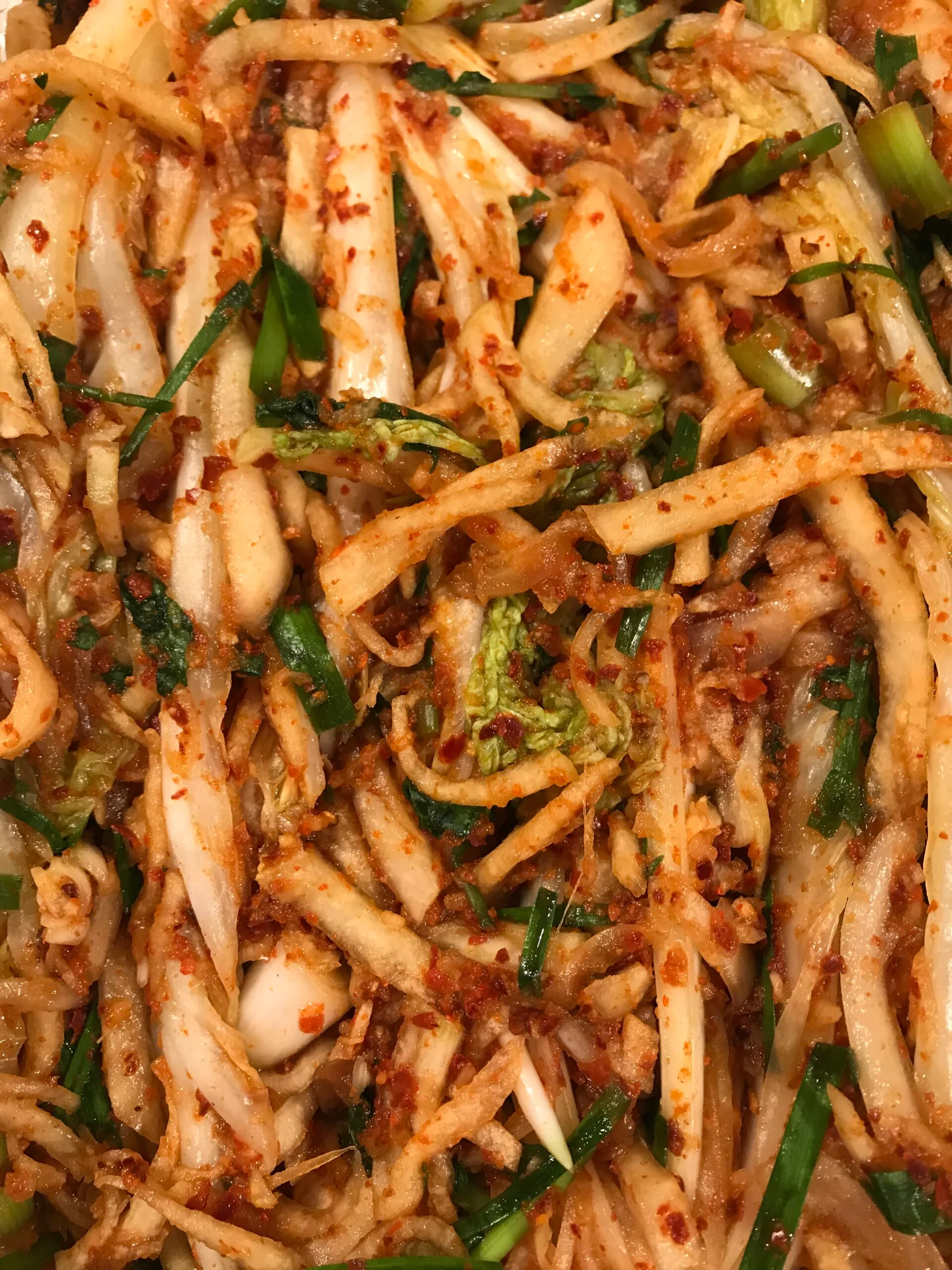Baechu kimchi represents the cornerstone of Korean cuisine, where humble Napa cabbage is transformed through fermentation into a complex, flavorful dish that graces every Korean table. This fundamental preparation of kimchi has been recognized by UNESCO as an Intangible Cultural Heritage of Humanity, acknowledging its profound significance in Korean culture. In Korean households, the making of kimchi, particularly during kimjang season (김장철) when families prepare large batches for winter, is a tradition that has bound communities together for generations.
What makes baechu kimchi particularly special is its role as both a daily staple and a living, evolving food. The fermentation process creates not just a side dish but a dynamic ingredient that changes in flavor and texture over time, from its fresh, crisp beginning to its mature, tangy peak. This transformation showcases the Korean understanding of food as a living thing, where patience and time are as important as the ingredients themselves.
In modern Korean dining, whether served in trendy Seoul restaurants or made in home kitchens around the world, baechu kimchi continues to adapt while maintaining its essential character. Its popularity has spread globally, introducing international diners to the complex world of Korean fermentation while remaining a proud symbol of Korean culinary heritage.
Why You’ll Love This Recipe
- Authentic Korean flavor
- Probiotic-rich
- Versatile usage
- Improves with age
- Customizable heat level
- Perfect for Korean cooking
What is Baechu Kimchi?
Baechu kimchi (배추김치) is the most common variety of kimchi, made from salted Napa cabbage and seasoned with Korean red pepper flakes, garlic, ginger, and fermented seafood. The vegetables are fermented to create a tangy, spicy, and complex flavor profile.

Traditional Kimchi
Ingredients
For Salting Cabbage
- 2 napa cabbage
- 1/2 cup coarse sea salt
For Porridge
- 1/2 cups water
- 1/4 cup sweet rice flour
Vegetables
- 1 korean radish julienned
- 3 carrots julienned
- 12 green onion(s) chopped
For Seasoning Mix
- 1 head garlic minced
- 2 tbsp ginger minced
- 1 medium onion(s) minced
- 2 tbsp fish sauce
- 2 cups korean red pepper flakes (gochugaru)
Instructions
Prepare and Salt Cabbage
- Quarter cabbage lengthwise
- Dunk the cabbage in a large basin of water to get them wet. Drain.
- Sprinkle salt between the leaves by lifting up every leaf and getting salt in there.
- Let the cabbages rest for 3 hours. Turn over every hour.
- After 3 hours, wash the cabbage under cold running water and remove salt.
- Let cabbage drain in a strainer while preparing seasoning
Prepare Porridge and seasoning
- While the cabbage is salting make porridge
- Combine the water and the sweet rice flour in a small pot. Mix well with a wooden spoon and let it cook over medium heat for about 10 minutes until it starts to bubble.
- Remove from the heat and let it cool off completely.
- Pour cooled porridge into a large mixing bowl. Add garlic, ginger, onion, fish sauce, and hot pepper flakes.
- Mix well with the wooden spoon until the mixture turns into a thin paste.
- Add the radish, carrot, and green onion. Mix well.
Assemble Kimchi
- In a large bowl, stuff kimchi paste in between each cabbage leaf.
- When every leaf in a quarter is covered with paste, wrap an outer leaf around itself and put into your jar or plastic container.
- Ferment 1-5 days at room temperature before storing in the refrigerator for up to threee months.
Nutrition
Recipe Tips
- Use coarse sea salt for brining
- Test cabbage for proper saltiness
- Wear gloves when mixing
- Keep temperatures consistent during fermentation
- Use clean, sterilized jars
- Look for high-quality gochugaru
Serving Suggestions
Serve with:
- Korean meals as banchan
- Grilled meats
- Soups and stews
- Fried rice
- Noodle dishes
Variations
- Vegetarian version (omit seafood)
- Extra spicy version
- White kimchi (no gochugaru)
- Add oysters or other seafood
- Include different vegetables
Storage
- First stage: Room temperature 1-5 days
- After initial fermentation: Refrigerate
- Keeps 3-6 months refrigerated
- Flavor develops over time
- Can be aged for stronger taste
My Essential Korean Pantry contains several of these ingredients, specifically:
– O’Food Anchovy Sauce
– Taekyung Korean Chili Flakes


Leave a Reply